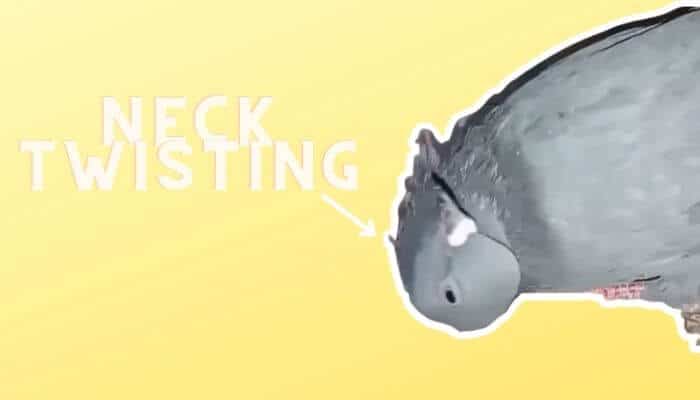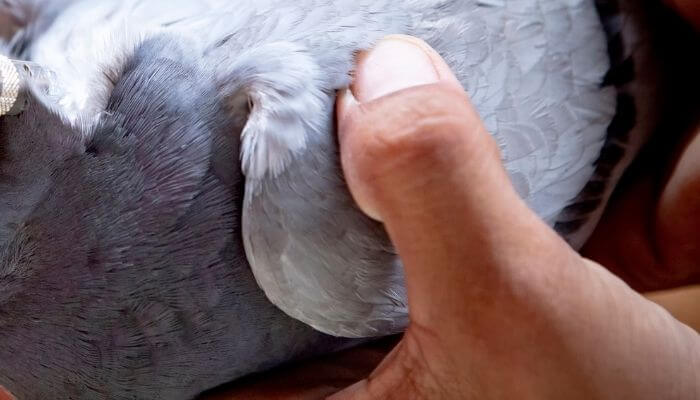There are two main causes of your pigeons’ neck twisting unnaturally, and they are either mechanical or infectious.
In most cases, birds that have caught and developed a form of Paramyxovirus will exhibit this symptom.
Some can show this clinical sign after having sustained trauma, while in others, it can be a consequence of a bacterial disease that has somehow managed to spread to their central nervous system.

Other symptoms besides pigeon neck twisting
If your population of birds is indeed affected by Paramyxovirus, we should note right from the beginning that it can be very challenging to treat.
Your pigeons might show a number of other clinical signs besides the neck twisting itself, such as the following:
- Vomiting
- Difficult breathing
- Green-colored diarrhea
- Lethargy
- Eye and nasal discharge
As you can imagine, all of these symptoms will make it difficult for the pigeons to eat or drink properly, which means that they can begin to suffer from starvation and dehydration in a matter of a couple of days.
The neck twisting can also lead to them not being able to maintain their body position or incapability of standing or defending themselves from predators such as hawks, for example.
The worst thing about this viral disease is that it can be transmitted to other birds in a shocking amount of time.
All of the sick birds release the virus through their urine and feces, and that is how it ends up in their living enclosures, where pretty much any other pigeon can come in contact with it.
To make matters worse, Avian Paramyxovirus is a pathogen that can easily survive in some of the most extreme conditions, being able to withstand dryness and cold temperatures.
We should also note that the people caring for the pigeons can be vectors of the disease if they do not use gloves or handle the birds carefully so as not to become contaminated with their droppings.
In the United Kingdom, the government advises people to report potential outbreaks because the authorities can intervene so as to limit the spread of the infection as much as possible.

This article was written by our qualified veterinarian Cristina.
This is part of our commitment to providing you with the most trustworthy veterinary advice for your pigeons.
Can you treat pigeon neck twisting?
It actually depends on the exact cause of this symptom.
For this reason, we strongly urge you to consult an avian vet that might have seen the same clinical manifestations in other birds in the past.
There are quick tests that can be used for accurate diagnosis, and your vet can recommend specific measures against Paramyxovirus if that is what your pigeons are suffering from.
There can be any number of other causes leading to this clinical sign. Trauma can be one, but in that case, you might not notice some of the rest of the symptoms that we have previously mentioned.
Some pigeons might twist their necks constantly or keep them in an unnatural position because of having been exposed to toxic substances.
For example, benzimidazoles can lead to this clinical manifestation.
Parasitic disease can sometimes lead to strange neurologic symptoms, where a parasite (such as Sarcocystis calchasi) actually migrates to the central nervous system of the bird and determines a clinical picture as a result of that.

As such, the veterinarian will first perform a differential diagnosis to determine the exact cause of the neck twisting and then initiate treatment.
For parasitic conditions, the vet will recommend a specific medication, while for a bacterial disease or trauma, they might try a different type of therapy.
The only real challenge is if the vet diagnoses your pigeons with Paramyxovirus.
If that happens, your only option is to separate the sick birds from the apparently healthy ones and care for both groups for the remainder of their lives.
Most pigeons that have Paramyxovirus will die because of the symptoms they show, both because they make it impossible for them to feed and drink water normally and because, on top of that, they have diarrhea, vomiting, and other complications.
Any viral disease can also lead to secondary bacterial infections, and most pigeons develop those, as well.
If some of the affected pigeons do survive, they might be left with long-term health complications.
How to prevent pigeon neck twisting
While trauma might not be prevented, you can do your best to ensure that your pigeons are living in the best hygienic conditions possible.
In terms of viral diseases, there are always vaccines available, so you should ask your vet whether there is that option for you and your pigeons.
Giving your birds medication for preventing parasitoses is another tip that we can suggest.
Do keep in mind that these drugs are often liver-toxic, so you should always administer them under the guidance of an avian veterinarian.
If there is an outbreak of Paramyxovirus in your pigeon flock, you should notify the local authorities so that they know what to expect.
This virus can easily be transmitted to other birds in your area, which can quickly lead to a full-blown epidemic.
If you keep and care for racing pigeons, make sure that all of the competitions you enroll them in are completely safe and that all of the birds need to have proof of vaccination in order to participate in them.
References:
- Investigation of many bacterial and viral infections circulating in pigeons showing nervous symptoms, Heba Badr et al, 2022
- Sarcocystis calchasi encephalitis in a rock pigeons, Nanako Ushio et al, 2015
- Assessment of vaccination of pigeons against Paramyxovirus Type 1 infection with inactivated aqueous-suspension or oil-emulsion vaccines, J.P. Duhatel et al, 1986
